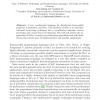Free Online Productivity Tools
i2Speak
i2Symbol
i2OCR
iTex2Img
iWeb2Print
iWeb2Shot
i2Type
iPdf2Split
iPdf2Merge
i2Bopomofo
i2Arabic
i2Style
i2Image
i2PDF
iLatex2Rtf
Sci2ools
135
click to vote
ERSHOV
2006
Springer
2006
Springer
Streaming Networks for Coordinating Data-Parallel Programs
A new coordination language for distributed data-parallel programs is presented, call SNet. The intention of SNet is to introduce advanced structuring techniques into a coordination language: stream processing and various forms of subtyping. The talk will present the organisation of SNet, its major type inferencing algorithms and will briefly discuss the current state of implementation and possible applications. Data-parallel programming languages such as Nesl, Zpl, Sisal, or SingleAssignment C (known primarily as SaC) are known to be suitable for creating highly efficiently executable concurrent code for numerical applications. Instead of relying on programmer-specified explicit annotations as required for Hpf or a library extension as is the case with MPI-based or OpenMP-based solutions, these programming languages are designed in a way that allows compilers to derive concurrency implicitly from homogeneous operations on large arrays. More recent work in the context of SaC demonstrat...
Coordination Language | ERSHOV 2006 | Programming Languages | SaC Programs | Theoretical Computer Science |
Related Content
| Added | 22 Aug 2010 |
| Updated | 22 Aug 2010 |
| Type | Conference |
| Year | 2006 |
| Where | ERSHOV |
| Authors | Clemens Grelck, Sven-Bodo Scholz, Alexander V. Shafarenko |
Comments (0)

